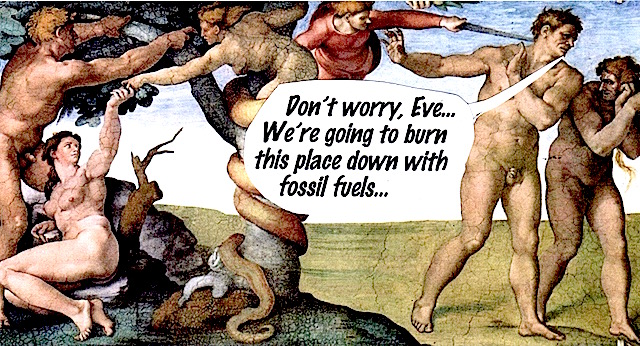Search
Recent comments
- kk BS....
14 min 44 sec ago - ISIS.....
2 hours 57 min ago - start now....
4 hours 2 min ago - AI vs poetry.....
5 hours 31 min ago - memories....
8 hours 2 min ago - putin said....
15 hours 11 min ago - santa sans snow....
17 hours 3 min ago - media for war.....
17 hours 10 min ago - russia included....
1 day 2 hours ago - far-right....
1 day 2 hours ago
Democracy Links
Member's Off-site Blogs
the environment through the ages...

- By Gus Leonisky at 8 May 2019 - 10:55am
- Gus Leonisky's blog
- Login or register to post comments
revenge...
animals of the species...
This joke is not new but still funny...
meanwhile at the royal scummo...
destroy...
One million of the world's species are now under threat of extinction, according to the biggest-ever review of the state of nature on Earth.
Key points:The UN-backed report was three years in the making and was based on systematic reviews of 15,000 scientific and government sources.
Among a vast number of alarming findings is that the average population size of native species in most habitats on land has fallen by at least 20 per cent, mostly since 1900.
More than 40 per cent of amphibian species, almost 33 per cent of reef-forming corals and more than a third of all marine mammals are now under threat.
"We are eroding the very foundations of our economies, livelihoods, food security, health and quality of life worldwide," said Sir Robert Watson, the chair of the Intergovernmental Science-Policy Platform on Biodiversity and Ecosystem Services (IPBES), which put together the report.
Read more:
Meanwhile:
A landmark bill which would set a target of zero carbon emissions for New Zealand by 2050 has been tabled in the New Zealand parliament.
Prime minister Jacinda Ardern said on Wednesday that the bill, which would introduce targets for carbon and biogenic methane emissions and would establish an independent climate change commission, was aimed at addressing the “long-term challenge of climate change”.
While parts of the bill have cross-party support, targets for the reduction of methane in the agricultural sector have been a source of dispute. The opposition National party says they are too high and environmentalists want the country to aim for net-zero emissions.
Read more:
https://www.theguardian.com/world/2019/may/08/new-zealand-introduces-bil...
the clash of religions...
koala capers...
SAVE THE KOALAS... see:
http://www.yourdemocracy.net.au/drupal/node/35140
remaining hopeful in quick sands...
Human society under urgent threat from loss of Earth’s natural life. The planet has seen sudden warming before, it wiped out almost everything.
These are some of the headlines that bombard us at ever increasing rates.
Each day new reports and household names such as David Attenborough warn of “irreversible damage to the natural world and the collapse of our societies”. The United Nations says we have 12 years to avoid climate catastrophe. We are also amidst the world’s sixth mass extinction, the worst since the time of the dinosaurs.
This reality is taking its toll on our mental health, especially among younger people who are understandably losing hope for their futures on a hotter planet. We are seeing the rise of what is known as climate or ecological grief. This grief summarises feelings of loss, anger, hopelessness, despair and distress caused by climate change and ecological decline.
We are facing a state of continual unfolding loss, compounding impacts on our psyches. It could be loss of animals and plants we hold dear or lifestyles we have grown accustomed to such as eating whatever we want whenever we want. As the time length between loss and impacts shorten, personal recovery times reduce. At the same there is anxiety about what is still to come.
Yet, there is no way to do justice to the threats we face without it being scary and provoking anxiety. How do we face up to these warnings without falling into apathy, denial, or being evangelically optimistic? How do we find a way to confront our climate and ecological reality and yet respond in a meaningful, purposeful way?
Former UN climate chief Cristiana Figueres has argued that the only way we can save the planet is with relentless, stubborn optimism. This is the kind of attitude that many of us are culturally trained to adopt, to keep looking on the bright side and remain hopeful.
...
People also need agency to act to avoid feelings of apathy and hopelessness.
Acknowledging this, the last decade has seen a focus on what the individual can do to tackle climate change in their own life. This has largely resulted in a politically passive eco-modern citizen that is more concerned with energy-efficient technologies, light bulbs and recycling than dissent, protest and structural change. Personal guilt comes to the fore when the virtuous lists and sustainable resolutions are not kept up with, and the issue is again pushed out of mind.
What is less encouraged is to make space for sorrow and grieving for losses already occurring at a rapid rate in the natural world.
Eco-psychologist Joanna Macy teaches useful frameworks for facing up to disturbing realities and finding capacity for action. First there is the gratitude stage, which focuses our attention on those aspects of life and the world that nourish us. Then there is a stage that honours the pain that we are experiencing. The third and fourth stages relate to exploring new possibilities and finding practical actions to take.
The second stage of “honouring the pain” is one that is often skipped over, as we naturally seek to protect ourselves from negative feelings. But making space for grief can help us confront the reality we face head on, and instead of just looking on the bright side, find a way to move forward.
Read more:
https://www.theguardian.com/commentisfree/2019/may/09/i-have-felt-hopele...
Read from top.
See also:
more bullshit from adman scummo... in leadership failures designed to fudge the australian carbon dioxide emissions...
and
traveling on the planet like flying white-antsin cheap oil — high price...